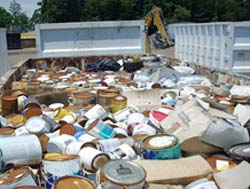
Nature of work
Hazardous waste management specialist works to ensure the safety of the public by developing appropriate ways of removing the hazardous materials from the environment. He/she works to gather, contain, and assess hazardous waste. He/she may be called in to conduct research on such material, or He/she may handle his/her own surveys. The specialist plays an active role in the removal and disposal of such materials. He/she constantly works to improve upon the processes and creates new methods and techniques.Hazardous waste management specialist assesses the facilities that deal with hazardous waste and provides findings based on his/her research and surveys. He/she is usually subject-matter expert, so he/she may be called to address special situations that require extra help in the area of hazardous waste.
He/she may actually gather hazardous materials, and he/she may work to separate them into types of waste, as necessary. He/she often works to inform other parties about how to appropriately dispose of different kinds of waste and what he/she can do to improve upon their processes. If there is radioactive waste, hazardous waste management specialists help to protect the public from any potential dangers by developing appropriate ways of removing the hazardous materials from the environment.
Environment of work
Though a hazardous waste management specialist may keep a standard office for research or to handle paperwork, he/she generally work in the field, which may require travel.The work life of a hazardous waste management specialist may be stressful, particularly in times of crisis. If specialist is called on for such a situation, then he/she must be prepared to deal with difficult circumstances and unusual surroundings. He/she may travel to report on their findings. Hazardous waste management specialist may not necessarily have a typical day, and their environment may very well change with some regularity.
To reduce his/her exposure to harmful materials, worker often wears coveralls, gloves, shoe covers, safety glasses, or goggles. Some must wear fully enclosed protective suits for several hours at a time; these suits may be hot and uncomfortable and may cause the workers who wear them to experience claustrophobia (fear of enclosed spaces).
Professional life
With a focus on the environment, job growth for hazardous waste management specialists is quite high. There are many different opportunities within a wide array of environments, including government sectors, educational facilities, communities, and individual corporations. The variety of different environments and employers means that there are excellent opportunities for growth, and a good amount of job openings for those just entering into the field. In times of crisis or natural disaster, the need for this expert in hazardous waste goes up exponentially.Range of typical starting salaries: 35000 SYP plus potential bonuses.
Getting the job
Hazardous waste management specialist usually has a bachelor’s degree, though the requirements may vary by position. It can be quite helpful to have the degree focused within chemistry, safety, or industrial engineering, but this isn’t usually a requirement. Any coursework in this area can help to prepare an individual or this role.Gaining on-the-job experience is often the best possible training for the role of a hazardous waste management specialist. There can be helpful seminars to attend as specialists progress throughout their career; ongoing training can serve them quite well.
The best way to get hired is to have a strong educational background as well as some good working experience. Some employers will overlook any educational lack or not hold those requirements as firmly if the individual possesses strong working experience. This is clearly a field where working in the job can help a person to get hired. Initially showing interest and having a degree can help to get hired, but as the hazardous waste management specialist moves on in this career, experience will play a more important role.
Skills
Detail oriented: Hazmat removal worker should follow safety procedures closely and keep records of his/her work.Math skills: Workers should be able to do basic mathematical conversions and calculations when mixing solutions that neutralize contaminants.
Mechanical skills: Depending on the size and type of the cleanup, hazmat removal worker may use sandblasters, power washers, or earthmovers to clean contaminated sites.
Teamwork: Most workers in this occupation work in teams. Because the work is highly structured.
Troubleshooting skills: Hazmat removal workers should be able to quickly diagnose the contents of a spill or leak and choose the proper method for cleaning up.
Sources and references
If you need any further information on what is included in this file, you can visit the following websites: www.ahmpnet.org, Alliance of Hazardous Materials Professionals
www.nahmma.org, North American Hazardous Materials Management Association
Arab Standard Classification of Occupations, 2008, Ed. Arab Labor Organization.
Summary
Hazardous materials (hazmat) removal worker identifies and disposes of asbestos, radioactive and nuclear waste, arsenic, lead, and other hazardous materials. He/she also clean up materials that are flammable, corrosive, reactive, or toxic.The work he/she does depends on the substances he/she is cleaning. Removing lead and asbestos is different from cleaning up radiation contamination and toxic spills. Differences also can relate to why these workers have been called in to clean a site
